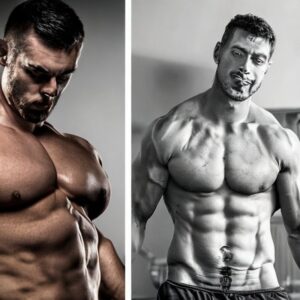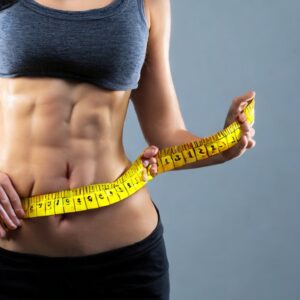 Fueling Your Fitness Goals: The Ultimate Muscle Building and Fat Loss Diet
Fueling Your Fitness Goals: The Ultimate Muscle Building and Fat Loss Diet
Welcome to this interview where we will be discussing the best diet for muscle building and fat loss goals. This topic is of great interest to many people who want to achieve a leaner and more muscular physique. In this interview, we will explore the importance of a proper diet, the role of macronutrients and micronutrients, meal planning, common diet mistakes to avoid, and supplements that can help achieve muscle building and fat loss goals. We will also provide tips and advice on how to stay on track and adjust your diet plan as needed.
Interviewer: Today we have an expert with us to discuss the importance of muscle building and fat loss, as well as the role of proper nutrition in achieving these goals. So, why exactly are muscle building and fat loss important?
Expert: Great question. Muscle building and fat loss are important for a variety of reasons. Not only do they improve overall physical function and athletic performance, but they also decrease the risk of chronic diseases such as heart disease and type 2 diabetes. Additionally, many people desire a leaner, more defined physique, and muscle building and fat loss can help achieve this.
Interviewer: That makes sense. So, what role does a proper diet play in muscle building and fat loss?
Expert: A proper diet is essential for muscle building and fat loss. It provides the necessary nutrients and energy to fuel exercise and support muscle growth and recovery. Additionally, a diet that’s high in protein and fiber can help control appetite and promote fat loss while preserving muscle mass.
Interviewer: Can you tell us more about the importance of vitamins and minerals in achieving these goals?
Expert: Absolutely. Vitamins and minerals play a crucial role in muscle building and fat loss. They help support immune function, aid in energy production, and play a role in protein synthesis, which is essential for building and repairing muscle tissue. Some examples of key vitamins and minerals include vitamin D, magnesium, and zinc.
Interviewer: That’s great to know. What about antioxidants and phytonutrients? How do they fit into the picture?
Expert: Antioxidants and phytonutrients are also important for muscle building and fat loss. They help reduce inflammation in the body, which can improve recovery and reduce the risk of chronic diseases. Examples include green tea extract and turmeric, which have been shown to have anti-inflammatory properties.
Interviewer: Interesting. And what about hydration? How does that impact muscle building and fat loss?
Expert: Hydration is essential for muscle building and fat loss. It helps transport nutrients and oxygen to the muscles, aids in digestion and metabolism, and helps regulate body temperature. It’s important to drink enough water throughout the day, especially during exercise.
 Eat Your Way to a Leaner, Stronger You: The Science Behind the Best Diet for Muscle Building and Fat Loss.
Eat Your Way to a Leaner, Stronger You: The Science Behind the Best Diet for Muscle Building and Fat Loss.
Interviewer: Moving on to meal planning, can you tell us more about meal timing and frequency?
Expert: Sure. Meal timing and frequency can play a role in muscle building and fat loss. It’s important to eat regularly throughout the day, with meals spaced about 3-4 hours apart. This helps maintain stable blood sugar levels and can prevent overeating. Additionally, consuming a meal or snack containing protein and carbohydrates within 30 minutes to an hour after exercise can help support muscle recovery.
Interviewer: That’s helpful. And what about calorie and macronutrient calculations?
Expert: Calorie and macronutrient calculations are important for ensuring you’re consuming the right amount of nutrients to support your goals. Calculating your total daily energy expenditure (TDEE) and then adjusting your macronutrient ratios accordingly can help you achieve muscle building and fat loss goals.
Interviewer: And what about pre- and post-workout nutrition?
Expert: Pre- and post-workout nutrition is important for optimizing exercise performance and recovery. Consuming carbohydrates before exercise can help provide energy for the workout, while protein and carbohydrates after exercise can help support muscle recovery and growth.
 Interviewer: Finally, can you tell us more about supplements for muscle building and fat loss?
Interviewer: Finally, can you tell us more about supplements for muscle building and fat loss?
Expert: Sure. Protein supplements, such as whey protein, can help support muscle recovery and growth. Creatine is another popular supplement that can help improve exercise performance. Branched-chain amino acids (BCAAs) are also commonly used to support muscle recovery. It’s important to remember, however, that supplements should not be relied on as the sole means of achieving muscle building and fat loss goals, and a well-rounded diet and exercise routine is still essential.
Interviewer: Thank you for your time and valuable insights.
Expert: It was my pleasure.
In conclusion, achieving muscle building and fat loss goals requires a combination of proper nutrition, exercise, and a consistent commitment to a healthy lifestyle. By following the tips and advice provided in this interview, you can develop a diet plan that supports your fitness goals and helps you achieve the results you desire. Remember to stay patient, be consistent, and make adjustments as needed to stay on track towards achieving your muscle building and fat loss goals.